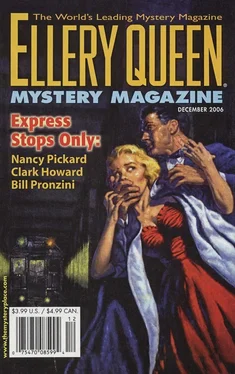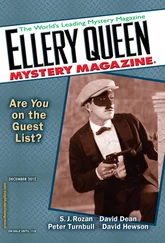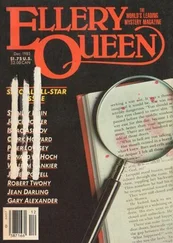Нэнси Пикард - Ellery Queen’s Mystery Magazine. Vol. 128, No. 6. Whole No. 784, December 2006
Здесь есть возможность читать онлайн «Нэнси Пикард - Ellery Queen’s Mystery Magazine. Vol. 128, No. 6. Whole No. 784, December 2006» весь текст электронной книги совершенно бесплатно (целиком полную версию без сокращений). В некоторых случаях можно слушать аудио, скачать через торрент в формате fb2 и присутствует краткое содержание. Город: New York, Год выпуска: 2006, ISBN: 2006, Издательство: Dell Magazines, Жанр: Детектив, на английском языке. Описание произведения, (предисловие) а так же отзывы посетителей доступны на портале библиотеки ЛибКат.
- Название:Ellery Queen’s Mystery Magazine. Vol. 128, No. 6. Whole No. 784, December 2006
- Автор:
- Издательство:Dell Magazines
- Жанр:
- Год:2006
- Город:New York
- ISBN:0013-6328
- Рейтинг книги:3 / 5. Голосов: 1
-
Избранное:Добавить в избранное
- Отзывы:
-
Ваша оценка:
- 60
- 1
- 2
- 3
- 4
- 5
Ellery Queen’s Mystery Magazine. Vol. 128, No. 6. Whole No. 784, December 2006: краткое содержание, описание и аннотация
Предлагаем к чтению аннотацию, описание, краткое содержание или предисловие (зависит от того, что написал сам автор книги «Ellery Queen’s Mystery Magazine. Vol. 128, No. 6. Whole No. 784, December 2006»). Если вы не нашли необходимую информацию о книге — напишите в комментариях, мы постараемся отыскать её.
Ellery Queen’s Mystery Magazine. Vol. 128, No. 6. Whole No. 784, December 2006 — читать онлайн бесплатно полную книгу (весь текст) целиком
Ниже представлен текст книги, разбитый по страницам. Система сохранения места последней прочитанной страницы, позволяет с удобством читать онлайн бесплатно книгу «Ellery Queen’s Mystery Magazine. Vol. 128, No. 6. Whole No. 784, December 2006», без необходимости каждый раз заново искать на чём Вы остановились. Поставьте закладку, и сможете в любой момент перейти на страницу, на которой закончили чтение.
Интервал:
Закладка:
“When did you see him last?”
“Just after I arrived this morning. Have you tried the brewhouse?”
“My next stop.”
The brewhouse was at the opposite end of the building. Lansing was nowhere to be found in the rooms containing the malt storage tanks and mash tun. Jacob Drew, the mash boss, a red-haired, red-bearded giant, reported that he’d seen Lansing in the fermenting room a few minutes earlier.
“What d’ye want with him, mister?” Drew asked. “Something to do with your inspection?”
“No. Another matter entirely.”
“The lad’s a weak stick, but he’s done competent work since poor Ackermann’s accident.”
“That he has,” Quincannon said. “Though not in the brewer’s art.”
He left Drew looking puzzled and followed a sinuous maze of piping to the fermenting room, a cavernous space filled with gas-fired cookers and cedar-wood fermenting tanks some nine feet in height and circumference. Two of the cookers contained bubbling wort — an oatmeal-like mixture of water, mashed barley, and soluble starch turned into fermentable sugar during the mashing process. After the wort was hopped and brewed, it would be filtered and fermented to produce “steam beer” — a term that had nothing to do with the use of actual steam. The lager was made with bottom-fermenting yeast at 60–70 degrees Fahrenheit, rather than the much lower temperatures necessary for true lager fermentation, because the city’s winters were never cold enough to reach the freezing point. Additional keg fermentation resulted in a blast of foam and the loud hiss of escaping carbon dioxide when the kegs were tapped, a sound not unlike the release of a steam boiler’s relief valve.
The heady aroma was strongest here. Once again Quincannon’s nostrils began to quiver, his mouth and throat to feel like the inside of a corroded drainpipe. He wished, ruefully, that a man could be fitted with a relief valve as easily as a boiler, to ease pressure buildup inside his head.
On the catwalk above the cookers, Caleb Lansing stood supervising the adding of dried hops to the cooking wort. Workmen with long-handled wooden paddles stirred the mixture, while others skimmed off the dark, lumpy scum called krausen, a mixture of hop resin, yeast, and impurities that rose to the surface. The slab floor, supported by heavy steel girders, was slick with globs of foam that a hose man sluiced at intervals into the drains.
Quincannon hastened to climb the stairs. From the catwalk, the cooking wort and interiors of the fermenting vats were visible. An unappetizing view, to be sure. The vat in which Ackermann had died had been cleaned and was no longer in use, but Quincannon’s imagination was sufficient to conjure up the scene that had confronted the workmen the morning after.
Lansing was a rumpled, obsequious sort in his middle years, given to smoking odiferous long-nines; cigar ash littered his loose-hanging vest and shirtfront. He had just finished consulting a turnip watch when he spied Quincannon. Sudden anxious tension pulled his vulpine features out of shape. The look of a guilty man, by grab; Quincannon had seen it often enough to know it well.
Lansing swung away from the low railing, came forward as he approached, and sought to push past him. Quincannon blocked his way. “I’ll have a word with you, Lansing.”
“Not now you won’t. Can’t you see I’m busy?”
“My business with you won’t wait.”
“What business?”
“Otto Ackermann. Xavier Jameson. And the West Star Brewing Company.”
Fright shone in the assistant brewmaster’s narrow face. “I don’t know what you’re talking about.”
“The game’s up, Lansing. I know the whole lay.”
Lansing said, “Damned fly cop!” under his breath and shoved past him. He would have run then if Quincannon hadn’t grabbed the trailing flap of his vest and yanked him around.
“No trouble now, or you’ll—”
The blasted scoundrel was quick as a cat, not with his hands but with his feet. The toe of his heavy work shoe thudded painfully into Quincannon’s shin, sent him staggering backward against the railing. Lansing fled to the stairs, clattered down them as Quincannon, growling an oath, regained his balance and hobbled in pursuit.
“Stop him!” he shouted at the workers below. “Stop that man!”
“No, no, don’t let him catch me!” Lansing cried in return. “He’s an assassin, he’s trying to kill me!”
The workers stood in clustered confusion, looking from one to the other of the running men. Lansing threaded through them, vaulted an intestinal coiling of pipes, and disappeared behind one of the vats. Quincannon might have snagged him before he escaped from the fermenting room if a moustached workman hadn’t stepped into his path, saying, “Here, what’s the idea of—” Quincannon bowled him over, but in doing so his foot slipped on the wet floor and he went skidding headfirst into a snakelike tangle of hose. By the time he disengaged himself and regained his feet, fought off clutching hands, and went ahead in a limping rush, Lansing was nowhere to be seen.
There was only one way out of this section of the brewery. Still hobbling, Quincannon went through the boiler room, past the corner room where the vats of rejected beer stood in heavy shadow, then past the freight elevator and down the stairs to the lower floor. An electrically lit passage led into the main tunnel that divided the building in half. He hurried along the tunnel, out onto the Seventh Street loading dock. There was no sign of Lansing anywhere in the vicinity. Half a dozen burly workmen were wrestling filled kegs onto a pair of massive Studebaker wagons; Quincannon called to them. No, they hadn’t seen Lansing come out.
So his quarry was still in the building. But for how long?
Quincannon’s leg still smarted, but he could move more or less normally again; he ran back inside. Perpendicular to the tunnel was another wide corridor that led in one direction to the shipping offices and the main entrance, in the other to the cellars. There was no exit from the cellars; he hastened the other way. But then he encountered a clerk on his way to the dock with a handful of bills of lading, who told him that Lansing hadn’t gone that way, either. The clerk had been conversing with another man in the passage for the past five minutes and would have seen him if he had.
Now Quincannon was nonplussed. He retraced his path along the side corridor to the brick-walled one that led downward to the cellars. A workman pushing a hand truck laden with fifty-pound sacks of barley was just coming up. Mr. Lansing? Yes, sir, just a few moments ago. Heading into the storerooms.
“The storerooms? Are you certain, man?”
“Aye. In a great hurry he was.”
Why the devil would Lansing go there? To hide? Fool’s game, if that was his intention. The storerooms, where all the ingredients that went into the mass production of beer were kept, were a collective dead end. So were the cellar rooms that housed filled kegs and the enormous cedar vats where “green” beer was ripened and finished beer was held before being piped to the company’s bottling plant in a separate building next-door.
Quincannon was not wearing his Navy Colt; James Carreaux had an aversion to firearms and would not permit them in his brewery under any circumstances. As he made his way down the passage, he berated himself for not defying Carreaux’s edict. Unarmed, he would have to proceed with considerably more caution. Men who blundered into uncertain situations were ripe for the suffering of consequences. This was doubly true of detectives.
The temperature dropped noticeably as he descended. When he reached the artery that led into the storerooms, the air was frosty enough to require the buttoning of his coat. He passed through a large room stacked on two sides with empty kegs. At its far end, a solid oak door barred the way into the remaining storerooms.
Читать дальшеИнтервал:
Закладка:
Похожие книги на «Ellery Queen’s Mystery Magazine. Vol. 128, No. 6. Whole No. 784, December 2006»
Представляем Вашему вниманию похожие книги на «Ellery Queen’s Mystery Magazine. Vol. 128, No. 6. Whole No. 784, December 2006» списком для выбора. Мы отобрали схожую по названию и смыслу литературу в надежде предоставить читателям больше вариантов отыскать новые, интересные, ещё непрочитанные произведения.
Обсуждение, отзывы о книге «Ellery Queen’s Mystery Magazine. Vol. 128, No. 6. Whole No. 784, December 2006» и просто собственные мнения читателей. Оставьте ваши комментарии, напишите, что Вы думаете о произведении, его смысле или главных героях. Укажите что конкретно понравилось, а что нет, и почему Вы так считаете.












